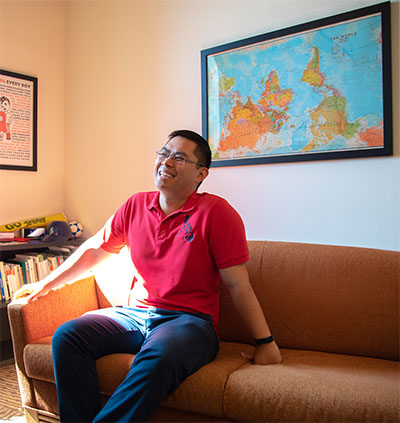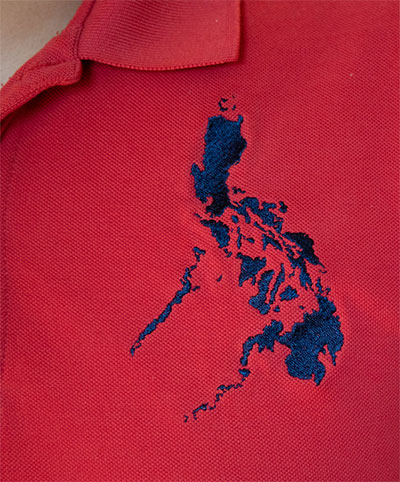
Facilitating Brotherhood
Paolo Laraño, a psychology resident with the Student Counseling Center, is creating a space for men to talk with each other about things like emotions and relationships.
UW Tacoma’s Dr. Paolo Laraño, a psychology resident with the Student Counseling Center, has a longstanding interest in the subject of men’s mental health. This began with an outreach program he co-developed ten years ago called “The Brogram” as an undergraduate resident assistant at New York University. Today, Laraño runs UW Tacoma’s Men’s Group, coordinated through the Counseling Center. “When I came to UW Tacoma in January, I wanted to work on creating a program that could make space for men to talk about the way we process our feelings,” he said. “Many programs that discuss toxic masculinity are more lecture-based, but it’s important we have a conversation with each other about healing.”
As a child, Laraño was aware of toxic masculinity without having a name for it. “When I was younger, I loved baseball – my dad even learned the sport just to teach me,” he said. “After joining a junior league baseball team for 10-12 year olds I started to really hate the game because of the pressure to be an alpha male through either being mean or verbally sexually explicit with teammates.” Laraño remembered his closest friends usually being girls and women, and felt disconnected from a lot of the men around him. “I grew up in a family with strong women who really influenced me to do better, especially in respect to evaluating the gender construct and what it means to be a good man,” he said.

Laraño went to college at NYU where he developed a passion for mental health. “There’s a strong emphasis on mental health at NYU because students have had so many issues over the years with depression and suicide as a result of pressures and expectations,” he said. “Originally when I started my college career, I had planned on being a journalist or an English professor. I never anticipated that I would become a therapist.” However, through studying English and music Laraño discovered that hearing and sharing stories could serve as a powerful tool for healing. At 24, he decided to dedicate his life to the work of healing as a community. “I was already volunteering my time to this when I made the decision, so it made sense,” he said. “Community healing and decolonization is my life mission, and if I wasn’t doing it through psychology, I would be pursuing it through another avenue.”
Laraño has been providing counseling at higher-education institutions for the last two years, but his experience working with men and boys in therapy extends farther back. “I had the opportunity to work with young men in the criminal justice system, many of whom were labeled as violent,” he said. “I think this interpretation comes from a lack of understanding, because many of them were posturing and using anger to cover other emotions they had.” This sparked questions for Laraño about how toxic masculinity is damaging for men and gets in the way of having a productive, healthy life. “I like to ask, ‘When you’re loud or angry, what are you afraid of?’ because I think that as men, we don’t realize that a lack of emotional understanding can lead to a quickness to anger that gets in the way of genuine connection,” he said.
While earning his doctorate in clinical psychology, Laraño worked at the University of Puget Sound (UPS) where he started a men’s group on campus last year. “At UPS, the students were mostly traditional students between the ages of 18-24, and were predominantly white,” he said. “At UW Tacoma, there are diversities of age, ethnicity, and socioeconomic background that make discussion so much richer because each participant has such a different experience in navigating masculinity.” Laraño noted that this kind of diversity can lead to additional insight that can be lost in groups with participants who have similar experiences.
Meeting on a weekly basis, the UW Tacoma Men’s Group runs for the length of the quarter. “The group is open for the first couple weeks so that people can decide if it’s something they’re interested in,” Laraño said. “I have participants do a one-on-one with me to check in before the group starts. After a few weeks, we close the group in order to assure confidentiality and build trust.” Laraño noted that this also contributes to the quality of conversations, and makes participants more comfortable in sharing, which can often lead to feeling vulnerable. “We want to set a norm of being uncomfortable or vulnerable – within limits, of course – because it’s crucial to being able to evaluate ourselves and grow,” said Laraño. “We’re trying to teach each other through examples of what it looks like to be a man and take ownership of our emotions.”
Laraño noted that he doesn’t go into meetings with an agenda, and instead allows participants to bring up what is on their minds and guide each other in discussion. “I encourage participants to respond authentically to each other, because it’s a way to voice our emotion in a healthy way,” he said. “The group is a good way to practice interaction with peers and build on tools for communication that will benefit us in the real world.” Participants discuss many things ranging from being in a relationship, feeling emotions, and what it’s like to process those emotion. “The process really becomes the most important aspect of the group,” he said.

Laraño was elated that the group took off at the beginning of spring quarter, noting that many of his peers had similar goals, but met with little interest in other campus settings. “I was excited by the response that the group got,” he said. “There is still so much stigma around men having emotions, but this is a valuable space to process and gain skills for dealing with difficult aspects of life.” Overall, the group is part of Laraño’s goal of encouraging a community mental health collaborative based on individual need. “I’m Filipino, and community and family has been a big part of my life. I think it’s a really valuable tool to form support systems in the community through being more open with each other about our needs,” he said. “Typically, the people around us want to help; we’ve all got something to contribute to a larger group.”
Going forward, Laraño has many ideas about expanding the group to reach a larger audience. “We’re in our pilot quarter, and still working with a smaller number,” he said. “In the future, I’d really like to broaden the message of the group into workshops through the Center for Equity and Inclusion to address issues of decolonization and toxic masculinity.” Along with this, Laraño wants to increase accessibility and give participants an opportunity to engage that is more experiential than academic. “Next year, the Counseling Center hopes to host an open forum to hear from the student body to understand what they need from us-- it’s our job to figure out how we’re going to make that happen,” said Laraño.
Laraño has a message for those who might be hesitant to come to a group therapy session. “Come talk to me. Day to day, we’re expected to function, but we all have things that can upset or trigger us,” he said. “Being a part of a group provides a safe, though not always comfortable, space to practice interacting with others.”



